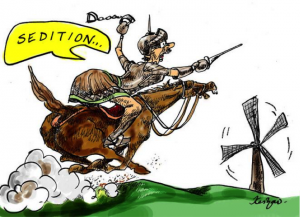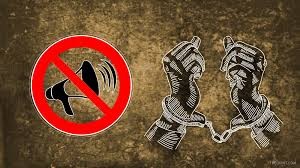In this blog post, Sourabh Makhija, a Law Aspirant pursuing a B.A. LL.B (Hons.) from RDVV, Jabalpur and having a Diploma in Cyber Law from Asian School of Cyber Laws, Mumbai analyses the need for sedition laws in India.
Introduction
Say something bad to me- It’s okay!
Say something bad to my family- it’s not okay, but it’s okay!
Say something bad about my nation- now you are in trouble!
The sentiments, emotions, anger of Indians can all be seen effortlessly when they listen to something against their country. They will prove you wrong with all their sweat and blood. Moreover, they will immediately put allegations on you for trying to incite them against their nation. Consequently, they will put you behind bars on SEDITION CHARGES. And then you will only wonder, what is sedition, what I did wrong and blah blah. Read this article to know what sedition means, what were the circumstances under which the concept of sedition originated in India and the necessity of sedition law in Independent.
What Is Sedition?
According to Oxford Advanced Learner’s Dictionary, the word sedition means, “The use of words or action intended to encourage people to oppose a government”.1
According to Google search engine, the word sedition means, “an act or conduct or speech inciting people to rebel against the authority of a state or monarch.”2
From the above two definitions, it is clear that the word sedition has two components:
- Sedition contains three actions, namely, an act, conduct or a speech.
- All these actions are intended to incite people to rebel against the state, government or the nation.
This seditious act has also been given place in the INDIAN PENAL CODE under Section 124A which states as: “Whoever, by words, either spoken or written, or by signs, or by visible representation, or otherwise, brings or attempts to bring into hatred or contempt, or excites or attempts to excite disaffection towards. 2[* * *] the Government established by law in 3[India], 4[* * *] shall be punished with 5[imprisonment for life], to which fine may be added, or with imprisonment which may extend to three years, to which fine may be added, or with fine.”3
The point worth noting here is, the word sedition is not mentioned anywhere in the IPC or the Indian Constitution.
What Was The Need For Sedition Laws In India?
As we know that most of the laws as prevailing in India are the gifts from the British to us, sedition law is one such law. The sedition law was introduced as an offence through clause 113 of the Draft Indian Penal Code by Thomas Macaulay in the year 1837. The reason for its incorporation in the draft was the increase in rebel by the Indian revolutionaries against the company rulers. The British seeing that the Indians were spreading hatred against them felt the need of a law which can suppress their rebel. As a result, the law of Sedition was introduced in the draft of Indian Penal Code. However, the Law of Sedition was not present in the original Indian Penal Code of 1860. It was in 1870 when due to rising rebels and unrest, the British government amended the Indian Penal Code and inserted Sec 124A. So we can say that the Law of Sedition took birth in 1870 in India.
The Sedition law wasn’t the only law which was passed by the British government to suppress the voices of Indian revolutionaries. Other laws such as the Vernacular Press Act, 1878, [repealed in 1881], the Newspapers (Incitement of Offences) Act, 1908, and the Indian Press Act, 1910 [repealed in 1921] – gave legal backing to the British government to restrict voices that went against it.
How Was The Law Of Sedition Used Against Indian Freedom Fighters?
It was a matter of privilege for Indian freedom fighters to be behind bars under the charges of 124A, as said by the Father of the Nation, “Section 124A, under which I am happily charged is perhaps the prince among the political sections of the Indian Penal Code designed to suppress the liberty of the citizen. Affection cannot be manufactured or regulated by the law. If one has no affection for a person, one should be free to give the fullest expression to his disaffection, so long as he does not contemplate, promote or incite to violence.”4
– Mahatma Gandhi, March 1922
The year 1892 saw the “first recorded state trial for sedition” in Queen Empress v. Jogendra Chunder Bose. The judgment “laid down a distinction between ‘disaffection’ and ‘disapprobation’, and observed”: “It is sufficient for the purposes of the section that the words used were calculated to excite feelings of ill-will against the Government, and to hold it up to the hatred and contempt of the people, and that they were used with an intention to create such feeling.”5
In 1898, in the case of Queen Empress v. Bal Gangadhar Tilak, the scope of the offense was expanded by the colonial courts and mere attempts to incite feelings of disaffection could be seen as sedition. The Tilak case defined sedition law under Section 124A for the first time6 as follows: “The offense consists in exciting or attempting to excite in others certain bad feelings towards the government. It is not the exciting or attempting to excite mutiny or rebellion or any sort of actual disturbance, great or small. Whether any disturbance or outbreak was caused by these articles is absolutely immaterial.” (Cited in Acharya, 2015)
The sedition law got more famous after the father of our nation, Mohandas Karamchand Gandhi, was jailed under the charges of sedition. Mahatma Gandhi was arrested by the British police on March 10 in 1922 for writing three ‘politically sensitive’ articles in his weekly journal Young India, which was published from 1919 to 1932. Gandhi was sentenced to a six-year jail term. Three charges were imposed on Gandhi; they were – ‘tampering with loyalty’, ‘shaking the manes’ and ‘attempt to excite disaffection towards the British government’.7
Do We Need Sedition Laws In Present Day Republic India?
The law of sedition was introduced by the Colonial Government to suppress the voices of Indians against them. But now, the Colonial Government has gone; India is an independent country. So do we still need sedition law? If yes, then for whom? And if no, then on what grounds?
The Indian pledge starts with; India is my country. All Indians are my brothers and sisters, but these lines have an exception, not all Indians are united. There are some people within the country who can’t see the country growing, who don’t want peace, who want to break the unity and integrity of the nation. Accordingly, we need sedition laws for such people for inciting their fellow citizens against their motherland.
Recently in 2016, we have seen cases where one single man was successful in gathering a crowd of hundreds just by abusing the nation and calling for its breakdown. Such incidents make us more willing to think that sedition law is needed even in the Independent India.
To support this point we can consider the case of Kanhaiya Kumar, the president of the Jawaharlal Nehru University Students Union and other students. This man named Kanhaiya was standing on a bench in the university’s campus and was shouting “BHARAT TERE TUKDE HONGE, (INDIA WILL BE IN PIECES)” and many such anti-national slogans which were attracting the people of his mentality to his side. A case of sedition against this man and several unknown students was lodged at Vasant Kunj (North) police station after the Home Minister Rajnath Singh talked to then Delhi Police Commissioner B.S. Bassi and released a statement: “If anyone raises anti-Indian slogans, tries to raise questions on the country’s unity and integrity, they will not be spared.”
Statistics proving that we still need Sedition Law
The National Crime Records Bureau (NCRB) published the sedition data for the first time in 2014 under ‘Offences against the state’ category.
According to NCRB, 47 sedition cases were reported across nine states in 2014. Bihar had the highest number of cases at 28 followed by 18 in Jharkhand and 4 each in Odisha and Kerala. Hence, it is justified to have the sedition law in the Republic of India.
Why India does not need a Sedition Law?
The law of sedition as present in independent India can be strongly questioned for 3 reasons:
1. Colonial law: The law of sedition was framed by the Britisher to suppress the rebellious Indians who were engaged in activities which were against the decorum of the colonial rule and is hence out of place in a democratic republic where the sovereignty rests with the citizens. 
2. Sedition law: Paradise for central and state government: The law of sedition is more likely to be a law for which the political parties crave for their own benefits. The ruling party misuses the power against anyone questioning their policies and criticising the functioning of government. It is said so because despite the highest judiciary of independent India has criticised the law; it has not yet been amended or repealed.
3. The existing provisions of the Indian Penal Code (IPC) are sufficient to address all threats to violence and public order.
During the first amendment, the then PM of India, Pandit Jawaharlal Nehru had identified offence of sedition being fundamentally unconstitutional and further said that “now as far as I am concerned [Section 124-A] is highly objectionable and obnoxious and it should have no place both for practical and historical reasons. The sooner we get rid of it the better.”
Law Of Sedition Vs Freedom Of Speech
Every case of sedition has a common defence that the action was done in pursuance of Article 19(1)(a). i.e.  It was his freedom of speech under which he said those statements. But what people are not aware of is Article 19(2) which states that a speech or an act should not be something which can invoke or incite others against the state. If something is capable of causing unrest in the nation, it can’t be defended by using Article 19(1)(a). Such an act which incites others to destroy the unity and integrity of the nation will be termed as sedition and not free speech.
It was his freedom of speech under which he said those statements. But what people are not aware of is Article 19(2) which states that a speech or an act should not be something which can invoke or incite others against the state. If something is capable of causing unrest in the nation, it can’t be defended by using Article 19(1)(a). Such an act which incites others to destroy the unity and integrity of the nation will be termed as sedition and not free speech.
Conclusion
The law of sedition was given to us by the colonial government in terms of Section 124A on which we are still relying. The law still has the same relevance as it had during the colonial rule, the only change is that the evil before independence were the freedom fighters and the evils now are the anti-national elements. Before independence sedition was a negative law for us as the people who were fighting for us were put behind the bars but after independence it has proved to be a positive law as the people going against and invoking others to go against the nation can be punished, which is required for the unity and integrity of the nation.
References:
- http://www.oxfordlearnersdictionaries.com/definition/english/sedition?q=sedition
- https://www.google.co.in/search?q=sedition&ie=utf-8&oe=utf-8&gws_rd=cr&ei=8tdsWPnpGMzOvgTCux8
- https://indiankanoon.org/doc/1641007/
- Gandhi, M. K., 2014. The Trial Speech. In: R. Mukherjee, ed. The Great Speeches of Modern India. Gurgaon: Random House, p. 83.
- Saksena, N. & Srivastava, S., April – June 2014 . An Analysis of the Modern Offence of Sedition. NUJS Law Review, pp. 120-147.
- Achary, P.D.T, 2015. Render sedition unconstitutional. The Hindu, 14 October. Available at: >http://www.thehindu.com/todays-paper/tp-opinion/render-seditionunconstitutional/article7758729.ece . [Accessed 18 March 2016].
- http://indiatoday.intoday.in/education/story/mahatma-gandhi-arrested-under-sedition-charges/1/616429.html
 Serato DJ Crack 2025Serato DJ PRO Crack
Serato DJ Crack 2025Serato DJ PRO Crack









 Allow notifications
Allow notifications



[…] does not appear anywhere in the Constitution or the IPC, like most of our archaic laws and codes, IPC 124A is the legacy of the British – Thomas Macaulay, to be specific. The clause was conceived as an […]